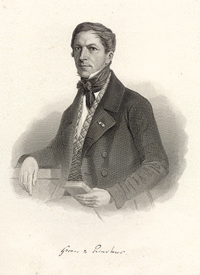Guillaume Groen van Prinsterer facts for kids
Guillaume Groen van Prinsterer (born August 21, 1801, in Voorburg – died May 19, 1876) was an important Dutch politician and historian. He played a big role in shaping Dutch politics during his time.
Early Life and Education
Guillaume Groen van Prinsterer's father, Petrus Jacobus Groen van Prinsterer, was a doctor. His family was part of the upper class in the Netherlands.
He was a member of the Dutch Reformed Church. This was the main church in the Netherlands and the church of the Royal Family. He felt the church needed to improve. He was inspired by a religious movement called the Réveil. This movement was similar to the Second Great Awakening in other parts of the world.
Groen studied at Leiden University. In 1823, he earned degrees in both literature and law.
Career and Political Views
From 1829 to 1833, Groen worked as a secretary for William II of the Netherlands, who later became king. During this time, he attended a Protestant church in Brussels.
After this, he became very active in Dutch politics. He led the Anti-Revolutionary Party. He was a member of the Second Chamber of parliament for many years. He also wrote many political articles.
Groen was influenced by thinkers like Guizot and Stahl. Their ideas shaped his writings and political actions. His most important historical books were Handbook of Dutch History (in Dutch) and Maurice et Barnevelt (in French).
He strongly disagreed with Johan Rudolf Thorbecke, another important Dutch politician. Groen believed Thorbecke's ideas went against religious principles. Even though Thorbecke's ideas became popular, Groen continued to oppose them until he died in 1876.
Groen's Core Beliefs
Groen believed that society was in a constant state of change, or "revolution." He thought these changes would get worse unless people returned to Christian values. He felt that following Christian teachings was key to a good society.
He warned that if people didn't return to Christianity, the future would be dominated by ideas like socialism and communism. He saw these as extreme versions of new, non-religious beliefs.
For Groen, many political options of his time were not good choices for Christians. He believed that politics should be based on Christian principles. He called for a "radical alternative" in politics. This meant building society on anti-revolutionary and Christian-historical ideas.
Groen saw a big difference between rebelling against God and having faith in God. He believed this difference was always present throughout history. For him, "Revolution" meant denying God's power and instead focusing on human power. He thought the ideas of the Enlightenment, which emphasized human reason, wrongly put human ideas above God's revelation.
He argued that this "Revolution" was not just a historical event. He saw it as a philosophical shift that went against Christian values. He believed it harmed natural rights, social relationships, and justice systems that were rooted in a God-given social order. Therefore, his "anti-revolutionary" position meant opposing this way of thinking. He felt it would lead to social problems and unfair rule.
Works in English
Some of Groen van Prinsterer's writings have been translated into English:
- Unbelief and Revolution: A Series of Lectures in History.
- The History of the Revolution in its First Phase.
- Christian Political Action in an Age of Revolution.
 | Kyle Baker |
 | Joseph Yoakum |
 | Laura Wheeler Waring |
 | Henry Ossawa Tanner |


